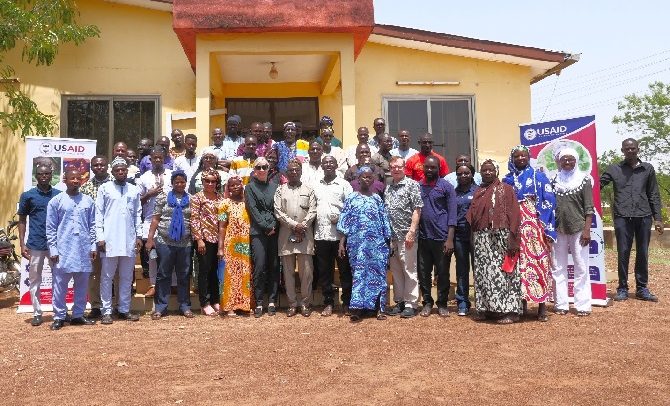In a bid to foster grassroots empowerment and accountability, a pivotal Sensitization/Interface meeting was organized in Savelugu Municipality by Grameen Ghana. Funded by USAID and implemented by Democracy International, this initiative marks a significant step towards enhancing governance across 70 districts in Ghana.
At the heart of the gathering, Grameen Ghana’s Executive Director, Mohammed A. Adams outlined the purpose and significance of district-level programmes. His address underscored the critical role of community involvement in driving accountability and fostering inclusive governance.
Following Adams’ address, Mugmin Musah, Head of Programs at Grameen Ghana, provided a comprehensive overview of the Ghana Performance Accountability Activity (PAA). Musah outlined key themes and objectives, highlighting the mission to amplify citizen demand for responsive services, enhance policy implementation efficiency, and uphold quality standards at the grassroots level.
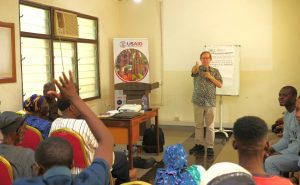
Noteworthy attendees included USAID Ghana Mission Director Kimberly Rosen, whose remarks emphasized the agency’s unwavering commitment to grassroots empowerment and sustainable development.
Additionally, PAA Chief of Party Dr. Ross Worthington underscored the initiative’s core objective: to strengthen service providers’ capacities and empower grassroots citizens to hold duty bearers accountable for their services.
The event drew a diverse array of participants, including citizen groups, community members, and service providers from sectors such as agriculture, health, education, and water and sanitation. Key members of the Savelugu Municipal assembly were also in attendance, reflecting broad-based support for the initiative.
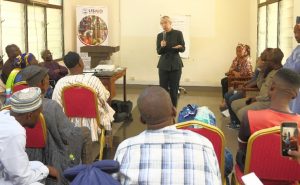
In a testament to its impact and reach, Grameen Ghana has organized similar district-level programme in Tolon district, Northern Region. This expansion underscores the PAA’s commitment to grassroots engagement and signifies the potential for widespread transformation across Ghana.
Under the PAA, Grameen Ghana oversees operations in 8 districts in the Northern Region, further solidifying its role as a catalyst for positive change at the local level.
As participants depart with newfound insights and a shared commitment to action, the Savelugu Municipality and Tolon district stand poised to embark on a journey towards enhanced accountability, inclusivity, and sustainable development. With Grameen Ghana leading the charge with Democracy International as the implementing partner and USAID’s steadfast support, communities across Northern region are primed to realize their full potential and shape a brighter future for generations to come.
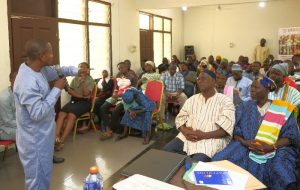
The Ghana Performance Accountability Activity
The USAID-funded Ghana Performance Accountability Activity (PAA) is a five-year mission starting from 2023 to enhance public service delivery and accountability in 70 districts spanning ten regions. The five northern sector regions are benefitting from the initiative with 40 districts. Spearheaded by Democracy International, this initiative aims to fortify the ties between the government, civil society, and local communities, fostering a culture of transparency and inclusivity.
The PAA’s multifaceted approach is designed to address the core pillars of governance, leveraging partnerships with governmental agencies, ministries, and grassroots organizations to amplify its impact. By aligning with USAID’s Accountable Governance Project and the Government of Ghana’s policy priorities, the PAA ensures seamless integration with ongoing efforts to promote equitable service delivery and inclusive governance.
At its heart, the PAA hinges on a Theory of Change premised on empowering civil society to monitor government performance and demand accountability, thereby driving improvements in service quality and accessibility. With intermediate objectives ranging from bolstering citizens’ demand for responsive services to enhancing the efficiency of government service delivery, the PAA adopts a strategic approach rooted in inclusivity, sustainability, behavioral insights, and collaborative partnership.
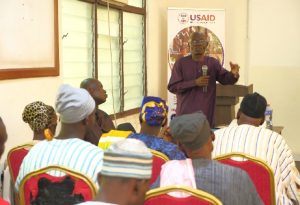
Of particular note is the PAA’s Graduation Strategy, signaling a pivotal shift towards local ownership and sustainability. As the programme progresses, implementing partners will gradually assume greater responsibility, signaling a transition towards self-sufficiency and autonomy in program implementation.
Furthermore, adaptive management principles underscore the PAA’s commitment to flexibility and responsiveness, ensuring that interventions remain agile and attuned to evolving needs and contexts. Through regular engagement with stakeholders and a proactive approach to problem-solving, the Performance Accountability Activity (PAA) aims to maximize its impact and foster sustainable outcomes.
With key objectives centered on fostering citizen demand for responsive service delivery, enhancing government policy implementation, and bolstering adherence to quality standards among local service providers, the PAA stands poised to revolutionize governance dynamics in Ghana.
As the initiative unfolds, all eyes are on the transformative potential of the PAA to usher in a new era of accountability, transparency, and equitable service provision, setting a precedent for sustainable development initiatives across the region.


